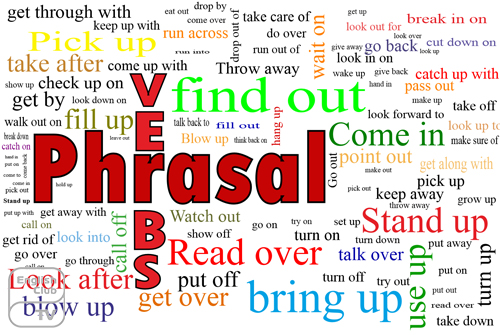Most Common Phrasal Verbs
Mar 29, 2018 - Here's a question for you: What's the most difficult thing about learning English? You don't need to learn long lists of phrasal verbs. I researched the 50 most common phrasal verbs in British English. Point out + that + SVO. #1 – Make it up to someone. #2 – Make up for something. Just read it!”. 1 Phrasal Verbs List This is a list of about 200 common phrasal verbs, with meanings and examples. Phrasal verbs are usually two-word phrases consisting of verb + adverb or verb + preposition.Think of.
Be taken aback to be shocked • I’d been taken aback by his behaviour at first, but it didn’t seem so shocking later on. Take after somebody resemble a parent (looks or behaviour) • I take after my mother; I have the same hair colour and the same green eyes. Who do you take after? Take away remove something from somebody / subtract (mathematics)/ carry food home from a restaurant • Dad!
Josh wants to take away my doll. Come and help me! • If you have five apples and take away two, you’re left with three. • A sandwich and a large Coke to take away, please.
Most Common Phrasal Verbs List
Take away from something make the value of something seem less • The fact that she’d cheated in the exam took away from her achievements. Take something apart to disassemble • I think you should take the keyboard apart to clean it properly. Take something back to say that you don’t really mean what you’ve said or written • Okay, okay, I’ll take it back. You’re not the worst singer I’ve ever heard. Take down separate the pieces of a structure / write down • We’ll have to take down the cupboard if we want to paint the walls. • My colleague will show you the flat while I take down your personal details.
Take for something to regard as • I don’t like being taken for an idiot. • I won’t take no for an answer. Take in give home to somebody / notice, absorb (and understand) / make clothes tighter/ to deceive • Last week I took in a kitten and she’s already the queen of the house. • I took in every word he said. It was an amazing speech.
• I’ll have this dress taken in at the waist, it’s too big. • I’m easily taken in, so please don’t lie to me.
Take off remove clothing / remove hair (at the hairdresser’s) / airplane begins to fly/ to leave/ to become successful • You don’t have to take off your shoes, just go right ahead. • Can you take off just a little at the back, please? • The plane took off twenty minutes late, but landed on time. • They took off in the middle of the party.
• My career took off immediately after I’d graduated. Take on accept a job, responsibility / to employ, hire somebody • I can’t take on any extra work, I’m too busy. • They want to take on ten more assistants.
Take over gain control • You can stop now, I’ll take over from here. • Unfortunately, my company was taken over by a multinational firm and I lost my job. Take out invite and go out with someone (to a restaurant, theater, disco etc) / to obtain some service/ get money from your bank account/ to kill somebody • George is taking me out to dinner tonight. • I had to take out a loan to start my business. • Let’s stop at the ATM.
I need to take out some money. • The serial killer was taken out by snipers.

Take (it) out on somebody make someone feel bad, because you are feeling bad too • Hey, I understand that you’ve had a horrible day, but don’t take it out on me. Take somebody through something to explain something in detail to somebody • I hope the instructions were clear.

I can take you through it again if you want. Take to to start liking/ to make a habit • I’d been worried whether my dog would get on well with the new puppy. I shouldn’t have worried- he took to it immediately. • I’ve taken to drinking my coffee black- I’d like to lose weight.
Take up start a new sport, hobby, school subject / fill space (or time)/ start again, resume • When I’m fluent in English, I’ll take up Spanish lessons. • This cupboard takes up too much space, I don’t want it in my living-room. • We took up where we had left off. Take somebody up on something accept an offer • You’re always welcome to stay with us when you’re in Paris. • Thank you, I’ll take you up on that the next time I come to France.
Take something up with somebody mention something in order to seek help from somebody • Why don’t you take the matter up with your local MP (Member of Parliament)? I’m sure he or she could help. More for you: I hope you’ve taken an interest in. Remember: the verb ‘take’ also has many different meanings in itself, why not revise them and now?